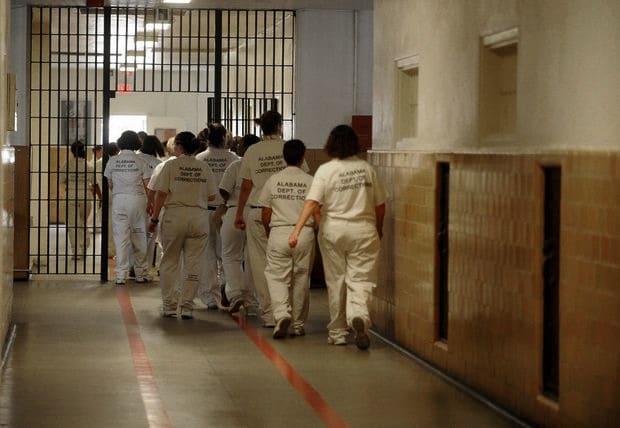Life After Prison: Ex-offenders Face Many Challenges When Reentering Society
Inmates walk through the hall at Julia Tutwiler Prison Wednesday, Sept. 4, 2013, in Elmore County near Wetumpka, AL.
Alabama’s overcrowded prisons currently house more than 25,000 inmates. The vast majority – about 97% – will one day be released and return to the communities they left behind.
After incarceration, former inmates face staggering challenges. All this week, WBHM’s Life After Prison series will explore the stories of Alabama’s recently released prisoners struggling to reintegrate into society. It’s part of our investigation into the Alabama prison system, in partnership with al.com and the Center for Investigative Reporting.
To start this series, WBHM’s Rachel Osier Lindley examines what stands between ex-offenders and a productive life outside of prison.
Haywood Speight sits on a folding chair in a small, sparsely furnished living room. The 34-year-old lives with his father in the Southside neighborhood of Birmingham. As a courtroom drama flickers on the TV, he talks about the first time he went to prison.
“I got charged with receiving stolen property,” says Speight. “I had bought a car and I didn’t know it was stolen.”
After his release in 2006, Speight struggled to find stable employment. He ended up in prison again, this time convicted burglary.
He’s now been free about two and a half years, and says he’s committed to living on the right side of the law. But finding work is still a challenge.
“Before the felonies I had good jobs,” Speight explains. “I used to work at driving a forklift, I used to work at Coca Cola, Pepsi, in masonry arts…so I had some good jobs before I caught the felony.”
Even with his skill set, he hasn’t heard back from any job prospects or any potential employers. When he does work now, it’s for his father, who runs a handyman business. They do constriction, electrical work and fix plumbing.
He says he’s close with his father, who is battling cancer.
“He’s going through chemo, but they say he’s doing a lot better now,” Speight says.
“I help him out, do a lot of cooking for him, washing clothes, the laundry,” he says. “When we do get a job, I’m mainly the one who does all the work,” he jokes.
Because of the support of his family, Speight is doing better than many of Alabama’s ex-offenders.
According to Joyce White Vance, U.S. Attorney for the Northern District of Alabama, his story isn’t uncommon.
“I think that people often come out of prison with just a crushing series of burdens they have to overcome,” says Vance. “In many ways, it’s overwhelming.”
For the last 5 years, U.S. Attorney’s offices across the country have been grappling with improving the re-entry of ex-felons back into society.
Vance says the largest barriers to building a normal life after prison are trouble finding jobs and housing, along with ongoing legal struggles.
And that’s on top of even more basic challenges, like transportation to work or to see a probation officer. Vance explains that often ex-offenders don’t have a driver’s license.
“So they’re caught on the horns of a dilemma. Do I not see my probation officer and get in trouble, or do I run the risk of driving without a license to see my probation officer? These are the kinds of very real problems ex-offenders face every day,” says Vance.
Vance’s office engages other federal, state and community agencies to help ex-offenders find assistance programs. Despite this, Vance thinks there’s more need for services than there are people currently providing them.
“I don’t know no groups that was trying to help you when you get out,” says Speight. He says he didn’t use any of the programs set up for ex-offenders.
This doesn’t surprise Kent Kerley, Justice Sciences professor at UAB.
“Often prisons do a fairly poor job of helping to set up successful integration,” says Kerley. “Often people are left to their own devices and own decision-making where they go next.”
Kerley says, without a support system or guidance, the decks are stacked against ex-offenders when they return home.
“They man be going back into situations where you may have economic disadvantage. You may have criminal lifestyles that are fairly rampant,” he says. “And you may have tremendous opportunities for drugs and other crimes.”
Because of this, U.S. Attorney Vance says two out of three ex-offenders commit crimes and return to prison within three years of their release. And that’s never part of the plan.
“No one leaves jail thinking ‘I can’t wait to commit another crime so I can go straight back to jail,'” she says. “Everybody comes out, probably not optimistic, but hoping they can find a way they can make it work.”
Haywood Speight tries to stay upbeat, despite his father’s illness and his own trouble finding work.
“I just go day by day, hoping things will get better,” he says. “That’s the only thing I can do for right now.”
He says he hopes to get licensed to be an electrician or a plumber, save some money and move closer to his mother and sisters in Georgia. One thing he knows for certain – he says he doesn’t want to see the inside of a prison again.
Jabari Peoples’ family, community, pushes for release of police body cam footage
Pressure is mounting on Homewood and state officials over the shooting death of Jabari Peoples by a Homewood police officer last month. Protestors took to city hall on Tuesday evening to demand officials release body-camera footage from the shooting that killed the Black 18-year-old.
Linda Yaccarino steps down after a turbulent two years leading X
Yaccarino, a traditional business executive, was in many ways a strong foil to the mercurial and controversy-courting Musk. She did not cite a reason for her departure.
Composer and pianist Jason Moran is latest departure from Kennedy Center
Another departure from the Kennedy Center: Composer, pianist, educator and bandleader Jason Moran announced on social media that he is no longer the artistic director for jazz. Moran joined the Kennedy Center in 2011.
After Iran’s war with Israel, questions return about Khamenei’s potential successors
After the 12-day war in June, the issue of who will succeed Iran's longtime supreme leader, Ayatollah Ali Khamenei, has become more urgent.
U.S. measles cases hit highest level in 33 years, CDC reports
The U.S. has hit an unwelcome milestone in measles cases this year. The CDC is reporting 1,288 cases across the country. The disease was declared eliminated 25 years ago.
What’s on the table for the 5 African Presidents meeting Trump at the White House?
President Trump is hosting 5 African leaders in Washington this week — a mini summit that's raising eyebrows over who was invited, what's on the table, and what it signals about U.S. rivalry with China and BRICS in Africa.








